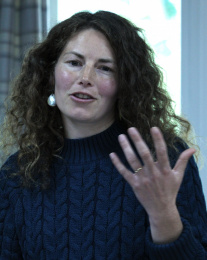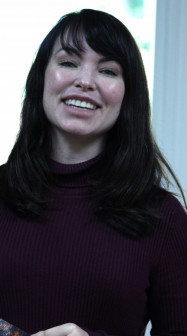Homes from home, oil, and troubled waters

After a childhood spent in Iran, Marjorie Lotfi’s family had to leave quickly, at about an hour’s notice. Subsequently she has lived in the US, and currently resides in Scotland. Kris Johnson is from and writes about America’s Washington state, but has lived in Britain since 2007. Ecopoet Yvonne Reddick’s poetry is influenced by the Middle East, where her father worked in the oil industry.
The backgrounds of these three poets reading from their debut Bloodaxe collections provided fascinating and differing perspectives at Berwick literary festival on Saturday.
Marjorie Lotfi’s poem ‘On seeing Iran in the news, I want to say’, in which she refers to the death of her grandmother, and how “I couldn’t go to say goodbye”, concludes with the line that also forms the title of her collection, “I’m the wrong person to ask”.
‘Maman Borzog’ focuses on family relations and national customs, never mind the fraught relations between two countries:
It doesn’t matter that she’s blonde,
this new daughter-in-law, doesn’t know
a word of Farsi, or how to taarof, always
refuse first, before accepting a gift.
Lotfi said that at first her parents were in favour of the clerical revolution in Iran, and thought that change would be good. They even took their children to demonstrations - “we saw a lot of things we shouldn’t see”. But things changed, as she relates in ‘Shut Out the Noise’, “the words on every brick / hurtled through our window: / Yankee go home.” She added: “Eventually it was too unsafe for my blonde, tall American mother to leave the house.” (‘Crossing the street for mother’s cigarettes’).
Still in the Middle East, and with the current news very much on everyone’s mind, she read two poems based on photographs from Gaza in 2014 and 2015, ‘Picture of Girl and Small Boy’, and ‘Picture of Boy, Looking Away’, the latter an image of a 12-year-old seated on the rubble of his home, where his father (who was also his teacher) was killed by a bomb:
… we’re waiting for the boy to square his gaze
and ask again, who’s going to teach me now? or hold up
his wrists to the camera, and cry mercy, mercy.
The poem ‘Checkpoint, Marveyev Kurgan’, refers to a woman pictured on the front of the collection, a daughter never heard of again by her family after a border was closed. The final poem, ‘The Hebridean Crab Apple’, is about a tree growing on an uninhabited island, and about the overriding theme of the collection, of finding a home: “And what is home if not the choice - / over and over again – to stay?”

The first part of her book contains lyrical descriptions of American’s Pacific Northwest, and the second section a sequence of poems focusing on the waterways of the same region mapped by the British explorer in the late 1700s, while searching for the elusive Northwest Passage. The poems are interwoven with ones about motherhood, such as ‘Lunar Darkness’ (“The grey marks on the moon’s face are not craters but stretch marks”).
In ‘Northwest Passage’ she concludes: “American is nothing if not longing … I no longer know if I set out to write about arrivals or departures or why I assumed there was any difference.” And with ‘Tectonics’ comes this realisation:
I used to believe the purpose
of life was movement.
I crossed oceans, continents.
I never stopped to consider
the mountain’s stillness
only its power:
old earth rising as new.
Kris Johnson’s journeys from the US included receiving an MA and a PhD in creative writing at Newcastle University, where she has also taught and worked as a researcher.

Her poem ‘The Gift’ explores how oil gets everywhere (“I wanted to write Speak, but it wrote Spark”. ‘Frankincense’ tells of her mother’s seismological work in Oman:
Oilfields reek of tar, but Omani frankincense
is the world’s most fragrant: a scent that suggests
the Magi, trekking the desert from Persia
to offer the tree’s tears to a small god.
‘Waterland’ is the last, and by far the longest poem in the collection. It envisages the eventual drowning of Cambridgeshire: “City built on water, don’t you know the Wash is getting closer?” It talks of captured eels slipping their tank and returning to the river; of the "skeleton whale in Zoology Museum / back in its element,” and predicts:
My sister’s children’s children will
weigh anchor. Sleep over the waves,
hunt under them. Raise
fish, graze kelp, their voices remembering
gills. They’ll listen
for whales in the shell of the ear.
This is an epic poem, with a number of voices, including Reddick herself breaking out into lines of song in a beautiful, clear voice from time to time. As I write this Storm Babet is blowing wildly; towering waves have taken the top off a lighthouse; local rivers in Northumberland are rising.



Stephen Gospage
Sat 21st Oct 2023 16:54
Fascinating report, Greg. May their voices continue to ring out loud. We need them.